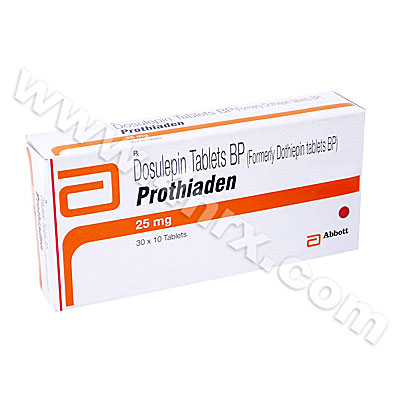 |
Home  Antidepressants Antidepressants  Prothiaden (Dothiepin) Prothiaden (Dothiepin) |
|
|||||||||
|
Prothiaden (Dothiepin)
What is Prothiaden (Dothiepin) used for? Prothiaden (Dothiepin) is a type of tricyclic antidepressant which contains the active ingredient dothiepin (also known as dosulepin). This drug is used in the treatment of depression and some mild anxiety disorders. It is also used to treat certain chronic pain disorders, in particular those that involve difficulty sleeping and appetite loss. Some patients have found that this drug may be useful in preventing migraine. How should I use Prothiaden (Dothiepin)? Prothiaden (Dothiepin) tablets should be taken orally. The exact dosage required varies, depending on the specific condition being treated and the patient's response to treatment. Therefore, it is essential to consult your physician before taking this medication so that the correct dosage can be prescribed. Patients should never abruptly discontinue taking this medication, as this may cause withdrawal symptoms. Instead, you should consult your physician, as your dosage may need to be reduced. What are the side effects of Prothiaden (Dothiepin)? Some side effects which have been reported by patients taking Prothiaden (Dothiepin) include:
Other side effects which patients may notice while taking this drug include perspiration, difficult urinating, unusually rapid heartbeats or convulsions. Please Note Strictly follow all instructions provided to you by your physician or pharmacist while using Prothiaden (Dothiepin). Optimum and safe dosage can differ based on the patient and the condition being treated. As this medication may be unsafe for certain patients, it is essential you always inform your physician if you are pregnant or breastfeeding, as well as if you have any allergies, other illnesses, or ongoing health conditions, especially heart conditions, liver problems or glaucoma, and if you are taking any other form of medication, supplements, or herbal products. Under no circumstances should this drug be taken by any patient who has taken a monoamine oxidase inhibitor in the last two weeks. Immediately seek emergency medical care if you have any allergic or hypersensitive reaction. Common signs of a reaction include hives, swelling, skin rashes, chest pains, as well as trouble breathing or swallowing. 
|
|||||||||||||||||